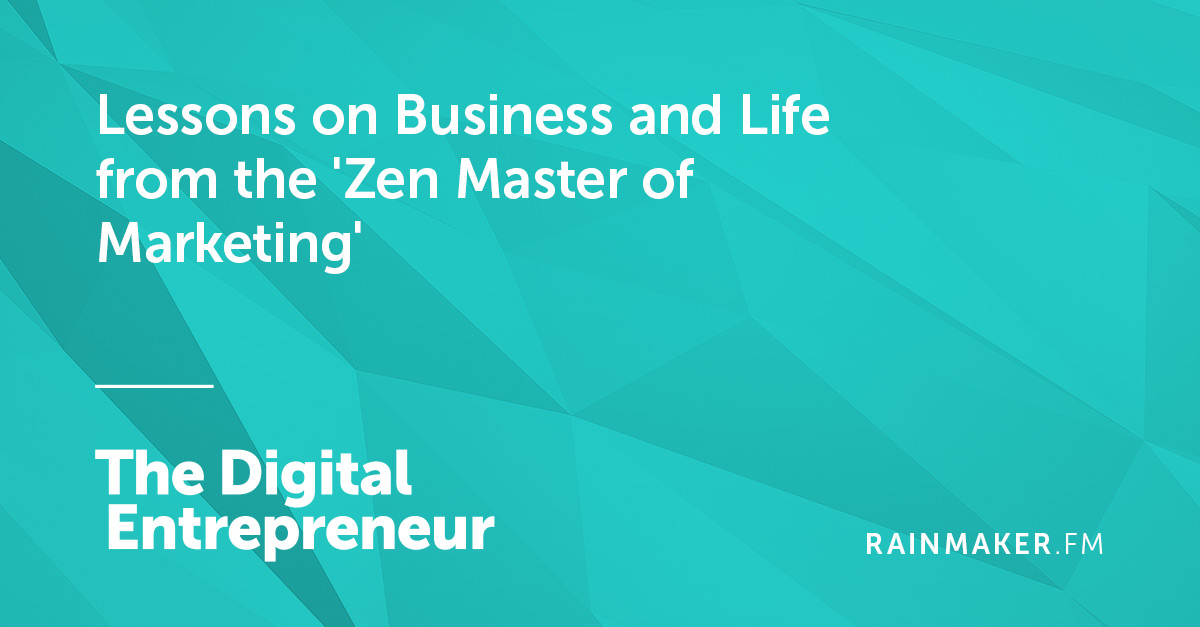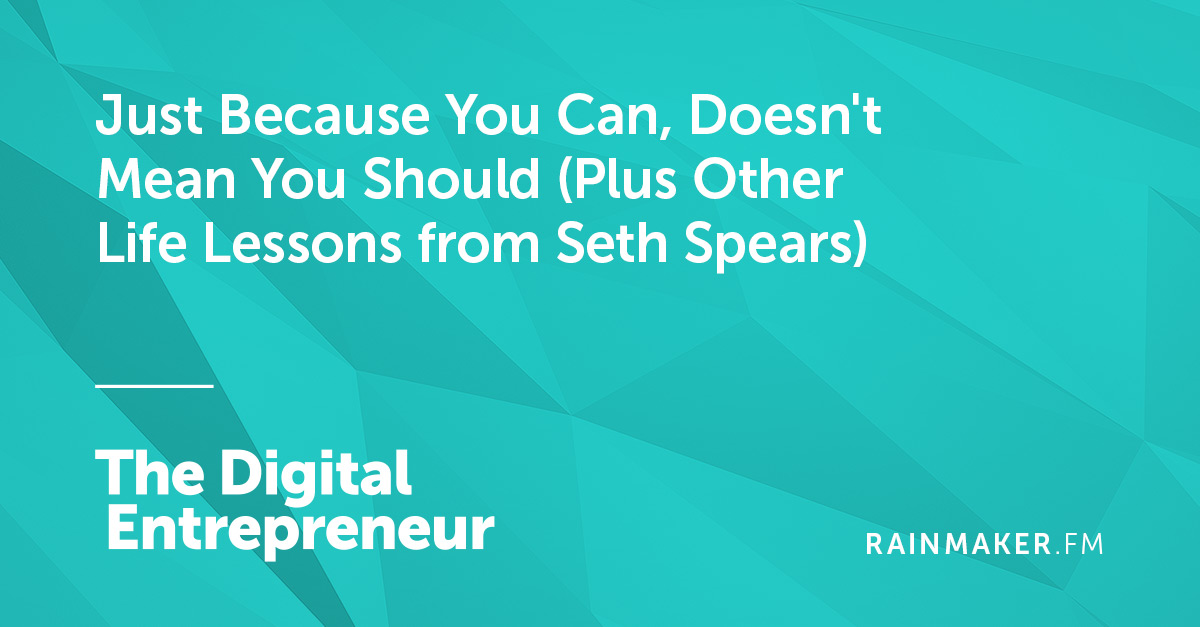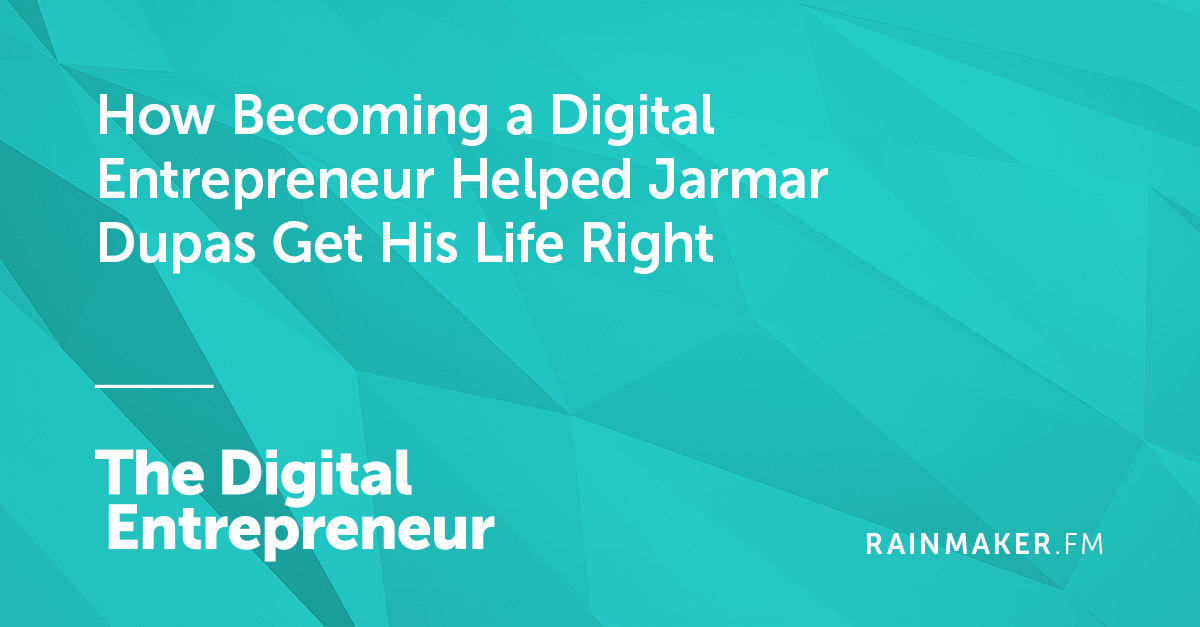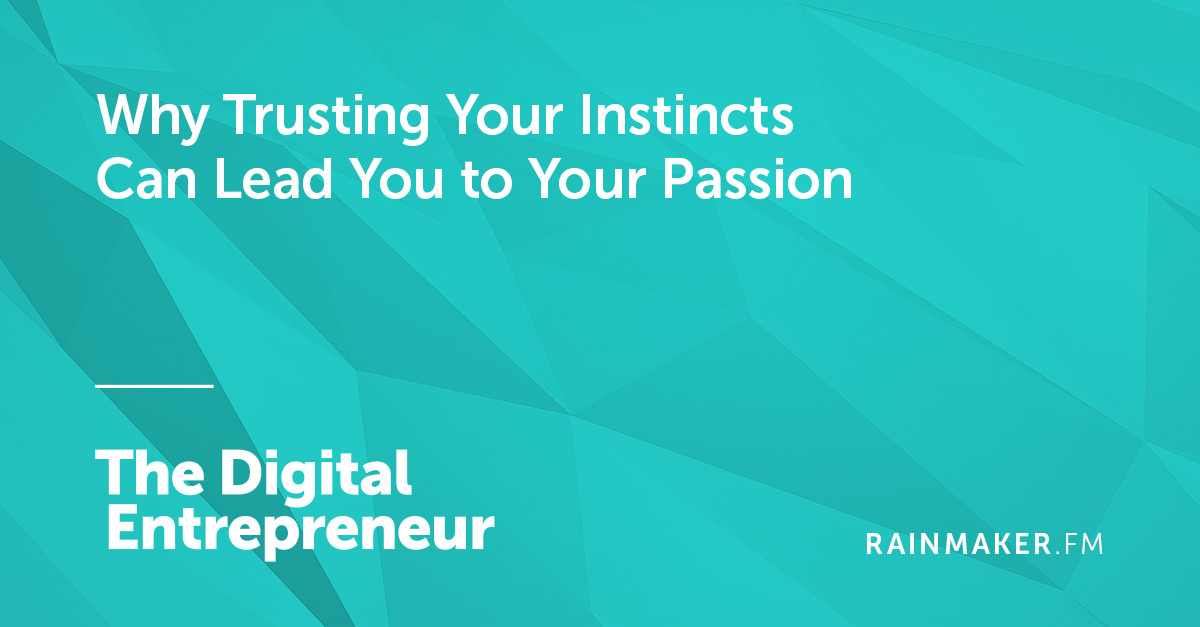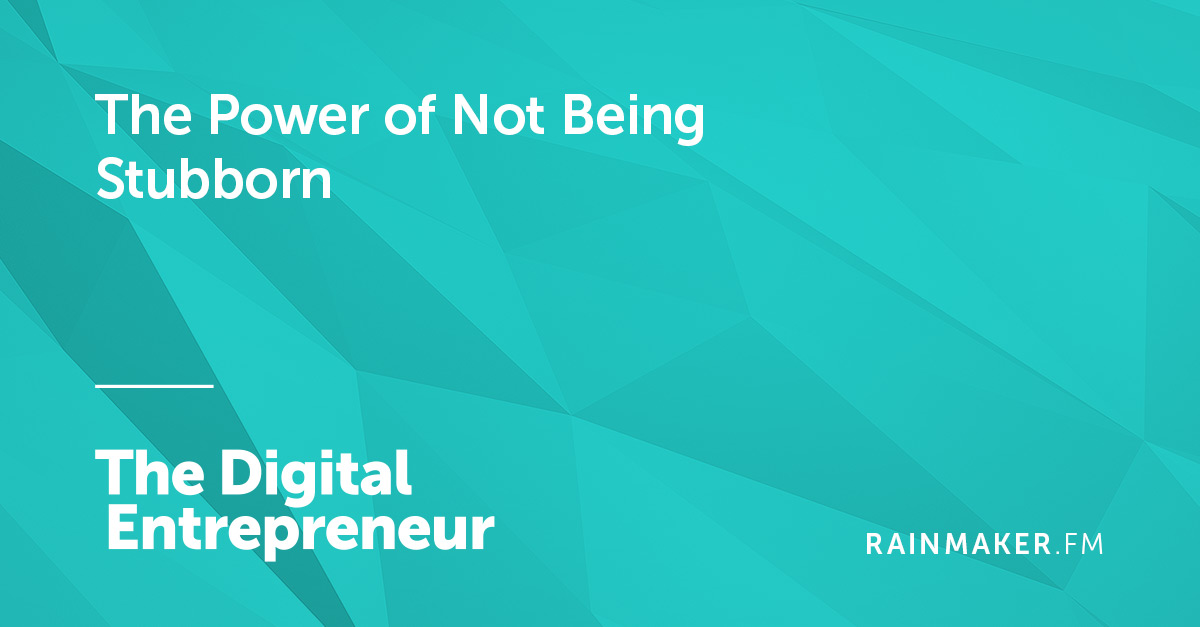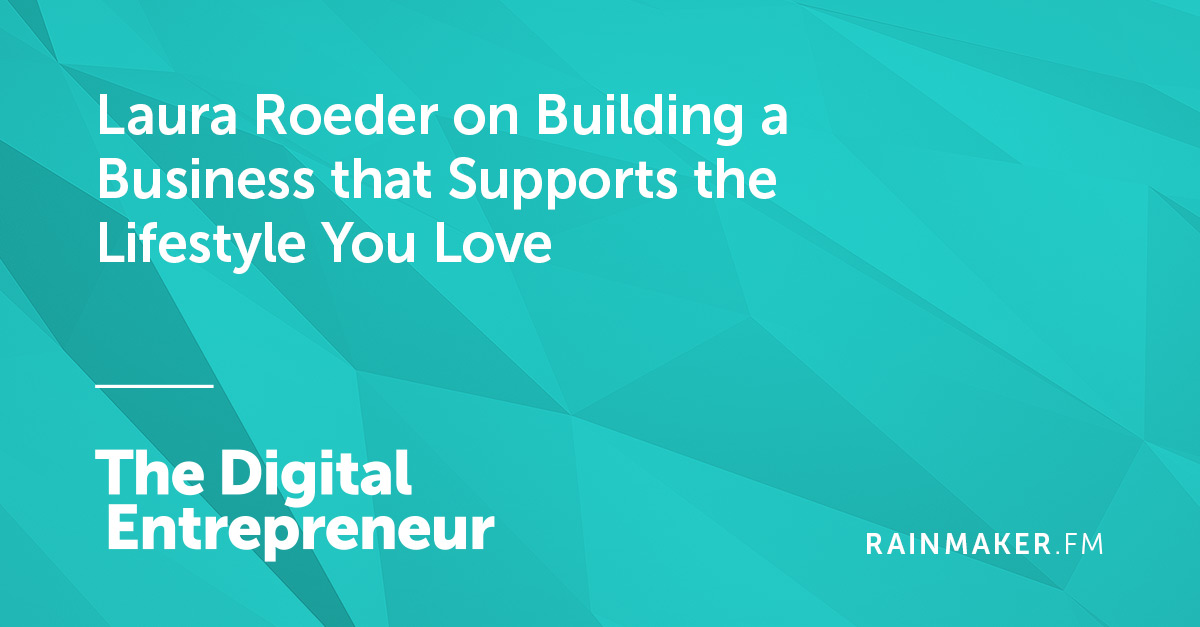
This week’s guest is a self-learner. She aspires to help people’s small businesses succeed beyond their wildest dreams by making social media marketing plain and simple to understand and implement. She is Laura Roeder, and she is a Digital Entrepreneur.
In this episode, Laura walks you through her journey as a digital entrepreneur:
- How being a mom has influenced her ability to reap the benefits of digital entrepreneurship
- How all the small choices she’s made over the years have added up to something incredible
- Why constantly innovating helps her deal with the challenge of bringing in new customers
- The one word she’d use to describe where see wants to take her business in the future … and why you should strive for it too
And more.
Plus, Laura answers my rapid fire questions at the end in which she reveals why she’s been keeping her phone in another room at night.
Listen to The Digital Entrepreneur below …
The Show Notes
- Begin your free, 14-day trial of the Rainmaker Platform and start building your own digital marketing and sales platform today at Rainmaker.FM/Platform
- Laura Roeder on Twitter
- lkrsocialmedia.com
- Jerod Morris
The Transcript
Laura Roeder on Building a Business that Supports the Lifestyle You Love
Voiceover: Rainmaker FM.
You’re listening to The Digital Entrepreneur, the show for folks who want to discover smarter ways to create and sell profitable digital goods and services. This podcast is a production of Digital Commerce Institute, the place to be for digital entrepreneurs. DCI features an in-depth ongoing instructional academy plus a live education and networking summit, where entrepreneurs from across the globe meet in person. For more information go to Rainmaker.FM/DigitalCommerce, that’s Rainmaker.FM/DigitalCommerce.
Jerod Morris: Welcome to The Digital Entrepreneur, the show where digital entrepreneurs share their stories and the lessons they’ve learned so that we can all be better in our online pursuits. I am your host Jerod Morris, the VP of marketing for Rainmaker Digital. This is episode number 38. This episode of The Digital Entrepreneur is brought to you by the Rainmaker Platform. I will tell you more about this complete solution for digital marketing and sales later, but you can check it out and take a free spin for yourself at Rainmaker.FM/Platform, that’s Rainmaker.FM/Platform.
On this week’s episode, I am joined by someone who was raised in an entrepreneurial family. She got her start at a young age and she got it actually when she started selling painted rocks. Although, her family members were her only customers at the time, and she is a self-learner when it comes to the web and online communications. After moving to Chicago to start her professional career, she quit her job at 22 years old.
Since then, she’s relocated several times, currently in Austin, Texas. She’s gone from a one-woman design business to a scalable social media consulting business. Now, obviously running a SaaS platform called Meet Edgar. She aspires to help people’s small businesses succeed beyond their wildest dreams by making social media marketing plain and simple to understand and implement, and giving them the tools to do it. She is Laura Roeder and she is a digital entrepreneur. Laura, welcome to The Digital Entrepreneur. It’s great to have you here.
Laura Roeder: Thank you Jerod, I’m very excited to be here.
Jerod Morris: It was nice to finally meet you in person at Digital Commerce Summit a couple of months back. That was nice.
Laura Roeder: Yes, yes. We had been emailing for many years and now I can picture you when I talk to you.
Jerod Morris: Yes, and you did a great job, by the way. Your presentation was fantastic. It was great having you there. It was a fun event.
Laura Roeder: Thank you, yeah it was.
How Being a Mom has Influenced Her Ability to Reap the Benefits of Digital Entrepreneurship
Jerod Morris: Let’s dive in here, and I’m going to start out with you the way I start out with everybody on this show, which is asking you this question about digital entrepreneurship and the value that you derive most from it. Because, I think, for most digital entrepreneurs the number one benefit that we get from it is freedom. The freedom to choose our projects, to chart our course to change our lives and our family’s lives for the better. What’s the biggest benefit that you have derived from being a digital entrepreneur?
Laura Roeder: Definitely the freedom and more specifically now that I am a mom, I feel like I’m really reaping the benefits of building this career for the past ten years. My son is almost two and I was able to take three months off maternity leave when he was born. I actually just worked part time for the first year of his life. Now I’m back to full time but I have a very flexible schedule and I go home for lunch for two hours every day. I pick him up from preschool in the afternoon and I can take time off whenever I want. Seeing some of my friends who have young children and both parents are working full time and it’s like, finding the time to go to Target is all they have time for on the weekend. I’m just very thankful that I’ve made these choices and built this life because it allows me to have a lot of freedom and I just think a lot less stress in my life.
Jerod Morris: I was looking at your website in preparation for this and one of the lines that really stuck out is where you say that you’re big on building a business that supports the lifestyle that you love. It sounds like you’ve really been able to do that.
Laura Roeder: Yeah, I mean that’s been very deliberate for me. I mean, even the switch from training to software was very deliberate in creating a business that I could really take a lot of time away from, and could continue to grow without me.
Jerod Morris: I guess to start here would be good to frame this by just giving people the overview of what you do, because you’re running Edgar now. Explain what Edgar does for folks who may not know it.
Laura Roeder: Yeah, Edgar is a tool to repurpose your content on social media. You create a library of all of your old blog posts and whatever else you send out on social, like funny images, inspirational quotes and whatever. Edgar pulls your content for you and also repurposes it over and over again, so that instead of having to manually schedule every update, Edgar looks at your library, makes sure that all of the content that you wrote a year ago that’s still valuable, it’s still getting shown on social, it’s still getting that audience.
Jerod Morris: Before you got into software, you alluded to this, you were doing scalable consulting for social media.
Laura Roeder: Mm-hmm (affirmative)
Shifting Gears into Digital Entrepreneurship
Jerod Morris: Let’s go back to even before that. Take us back to before you became a digital entrepreneur. What were you doing and what was missing that led you to want to make a change?
Laura Roeder: Well, I became a digital entrepreneur really young. I’ve only had one real job. My first job out of college was a designer at an ad agency. I was there for about a year and half and the freedom was definitely part of it. I remember having a friend visit me. I was living in Chicago at the time. She visited me and I worked til 6:30 or whatever, and we’d have time to have dinner and then that was it. That was all I got to see her while she was visiting. I remember when I visited her, she had a more flexible schedule and she could take the whole day to spend time with me. I thought, Ah, that’s what I want to be able to do.
And I was kind of bored of my work and I wanted more control over what my work was and how I spent my day. So I quit that job when I was 22 to start working for myself as a freelance designer. I’ve worked for myself ever since, for the past ten years.
Jerod Morris: You were a freelance designer and then you basically took some of what you’d been doing as a freelance designer, some of what you had learned and then parlayed that into teaching other people? How did you then get into social media and doing that part of it?
Laura Roeder: As a designer I was making websites for my clients, and just because I was young and naive, I thought that when you made a website you were also telling your clients what content to put on it and the strategy for traffic and SEO. I just thought I’m making the website. They need to know how to get traffic and how to drive business, and how to turn their leads into customers. I would just help them with all that stuff, that was what was free and they’d pay me for designing and building the site.
Around 2007 – 2008 social media started to become a thing. My clients would just ask me, What is it? Should I be using it? How do I do it? Eventually, enough people told me you know, you could get paid just for talking to people about social media, just for teaching them, at the time it was Twitter, teaching them how to use Twitter. I thought, That sounds like a sweet gig, talking to people about Twitter. Sign me up. That’s how I became a social media consultant, which very quickly turned into productized training.
How All the Small Choices She s Made Over the Years Have Added Up to Something Incredible
Jerod Morris: Tell me about the moment in your career as a digital entrepreneur thus far that you’re the most proud of.
Laura Roeder: Oh man, at this point there’s a larger team. At Meet Edgar we have 24 employees. We’re all remote so we don’t have any kind of office. We meet up twice a year. For me, what’s very fulfilling is providing great jobs. For whatever reason, that’s even more inspiring to me than the work we do for our customers is getting to provide a workplace that people can really do their best work and they love showing up to every day. My greatest moment as a digital entrepreneur has happened, honestly, every time we’ve met in person because every time it’s more people.
The last one was actually in Denver and we filled a conference room, I mean a small conference room, but we filled a conference room nonetheless. We had to bring in extra chairs and it was just so moving and so amazing to me looking around the room and thinking, I’m supporting these people s families from this company that I built on the Internet. So often it just feels like this imaginary thing, like we never see any of the money, it’s all people paying us on credit cards, going through straight to our bank account. It’s really nice to have this physical representation, seeing my team in a room, saying, Wow, this is a real thing that I built.
Jerod Morris: You know, that’s so interesting, because when we get together at Rainmaker Digital, since I’ve been with the company we’ve had four or five of those meetups. It is always so powerful to get everybody in the same room. I have, of course, done it from the perspective of one of the people working for Rainmaker Digital. I can’t imagine how that must feel in your shoes or in Brian Clark’s shoes when you’re sitting there and looking at it. What you started is what led to all of this. That has to be just such a powerful moment and such a powerful realization.
Laura Roeder: It really is. It’s just amazing seeing that an idea and just that little bit of work everyday, because when you’re in it, it’s just like you’re plodding along every day a little bit more. All these small choices that you make over the years really do add up to something incredible.
Jerod Morris: Yeah, and it reminds you of your why. Why you’re doing it in the first place.
Laura Roeder: Yes.
Jerod Morris: Okay, so let’s take a quick break and when we come back I’m going to ask Laura about her most humbling moment as a digital entrepreneur. Stay with us.
As you probably know, stitching together a website that truly gives you everything you need to demonstrate your authority, connect with your audience, and earn recurring profit isn’t easy. You have to find good hosting plus security and support you can trust, which is a headache. You need a patchwork of plugins that can prove to be a nightmare at the worst possible time. You need the ability to create content types ranging from blog posts to podcasts to online courses and what about integrated landing pages, email marketing and marketing automation to deliver a truly adaptive content experience. These aren’t nice-to-have features anymore for the smart profitable digital entrepreneur, they are necessities. But you have two choices: you can piecemeal it all together, pay more in total and then cross your fingers and hope everything plays nicely together, or you can use the Rainmaker Platform.
Rainmaker is a fully hosted, all-in-one marketing and sales machine that gives you everything out of the box in one dashboard. You can run a successful podcast, host authority building membership areas, and sell in-depth module based revenue generating online courses. You can even use RainMail to host all of your email lists and send broadcast emails and autoresponder sequences right there in your Rainmaker dashboard. Plus, the full email integration with your website platform gives you insight about your audience and content flexibility that you simply cannot get with separate solutions stitched together. Oh, and rather than having to choose from one of a hundred different places for support when you have a question with Rainmaker it’s just one support team ready and excited to help you out.
All of these reasons and more are why Rainmaker.FM runs on Rainmaker and why all of my personal websites do too. But, don’t just take my word for it, check out the Rainmaker Platform for yourself. Go to Rainmaker.FM/Platform and start your free 14 day trial today, that’s Rainmaker.FM/Platform.
Now back to my interview with Laura Roeder.
Finding Humility in the Various Life Experiences of Your Customers
Jerod Morris: All right Laura, you just told us about your most proud moment as a digital entrepreneur. Tell us now about the most humbling moment in your career as a digital entrepreneur, and most importantly what you learned from it.
Laura Roeder: Something that’s always really inspired me when I was doing training, is the people who really didn’t consider themselves very computer savvy and knew that this is what they needed to do in order to grow their business, in order to keep up. Because I think so many people limit themselves and think, Oh, I’m too old, or, I’m not very good with computers, I can’t really learn that.
I remember I had … when I was doing training programs and sometimes you could buy the premium package and get phone calls with me. I remember having a call with this company that was very old school, brick and mortar, and the owner had sent me some emails that were just so sweet that were like, We just so appreciate what you do and we’ve learned so much from you. We got on a call and when I started talking to the guy he started laughing, hearing my voice, and he was, “We call you the girl that talks to us from the computer. Now here you are really talking to us.” He just thought it was so funny, like it was just this novelty for him that he’d heard my voice on the computer and now I was a real person.
It was very humbling, someone who had just such a big learning curve about online marketing and social media. Seeing that he was, I’m going to spend my time. I’m going to spend my money. I’m going to do the premium package so that I can get more one-on-one help and I’m going to learn this. I’m going to have a great business because of it. I really admire that kind of determination and that really is something that I found very inspiring in the training business. Because, it can just be easy to create this content and just forget about who’s consuming it and the impact that it’s having.
For some people this was a game changer, right? Because for a lot of people it’s like, Okay, I already know what content marketing is. I’m improving my skills 5%. But, some people, this was like, Wow, I just took my business from a brick and mortar to literally a global business because of what I learned in this class. That is very humbling.
Striving to Maintain Stability in a Volatile World
Jerod Morris: Yeah, no absolutely. Let’s fast forward to now. What is the one word that you would use to sum up the status of your business as it stands today? One word.
Laura Roeder: The word that’s been guiding me lately is stable. Something that has been a challenge for us in the past two years … Meet Edgar is only two and a half years old but we’ve grown really fast. We’re at a four million annual reoccurring revenue, starting from zero two and half years ago.
Jerod Morris: Wow.
Laura Roeder: We’ve had some pretty fast growth. Hiring to keep up with that growth has been really challenging. Our goal for the end of the year has been to really build out our teams for 2017. Instead of hiring every month, we’re like, Who do we want for the whole year and we’re going to hire them by the end of this year or early next year? We’re not 100% there yet, but my dream is to, instead of feeling like there’s this frantic growth, obviously keep growing the customer base, keep growing the revenue, but the team to feel really stable and this really tight knit community of people who have gotten really comfortable working together, and have really gotten their rhythms down. You know how it is when you work with someone for a few years and you can read their mind and you know what they’re going to do. I love to have that kind of rhythm within our own company, so stable is what we’re looking for right now.
Why Constantly Innovating Helps Her Deal With the Challenge of Bringing in New Customers
Jerod Morris: Okay, very good. What is your biggest recurring pain point as a digital entrepreneur?
Laura Roeder: I would actually say that it just continues to be customer acquisition, because you have to keep innovating. I’m definitely a big believer in the bread and butter and just doing basics of online marketing. That’s absolutely how we get the majority of our customers. But, as we continue to grow, we have to keep expanding our thinking both about how to up our game and improve our content marketing and social media marketing game, and totally new channels that we might want to explore. Customer acquisition, it s fun, but it is an ongoing pain point because it’s a problem that’s never solved.
Jerod Morris: Yeah, that’s true for everybody. You mentioned earlier how much satisfaction you got from that moment when everybody was together and you had that realization about how this all happened because of what you started. I know that gives you a lot of satisfaction on a macro level, but on micro level, what element of your work gives you the most satisfaction on a daily basis?
Laura Roeder: My job is now is mostly coaching the leaders of our teams. What gives me the most satisfaction is seeing people make hard decisions. When something s not going right and a tough call needs to be made, maybe a project needs to be scrapped that we’ve already put a lot of effort into. Maybe we need to start over with a new direction. Maybe a team member isn’t working out or a freelancer isn’t working out and needs to be let go. Watching the leaders on my team make those tough calls and put into action those tough calls, I love it.
Using Your Own Tools to Make Life Easier
Jerod Morris: Yeah, that’s great. Let’s open up your toolbox here a little bit, if you don’t mind. What is the one technology tool that contributes the most to your success as a digital entrepreneur?
Laura Roeder: Okay, well I have to cheat and say Meet Edgar.
Jerod Morris: You can do that.
Laura Roeder: You know it’s funny, so obviously we use Edgar. The person who does our social media at our company, basically his attention went elsewhere. There was more important stuff that he had to do, so he took a lot of attention off social. We’re trying to figure out, Who do we need to hire? Do we need a freelancer or do we need a full time? We just stopped messing with it for a while and we realized Edgar handles our social, because now we have our customer support team going in and responding to people and monitoring the daily activity.
As far as keeping up with the content, Edgar really does that for us and Edgar really sends everything out. You really can just check in once a quarter and refresh things. That was a pretty cool moment to see, Oh, this thing that we would have previously had to hire maybe a full time role for, Edgar is just doing for us. That’s pretty cool.
Jerod Morris: Yeah and by eating your own dog food you found that out. That’s nice, and that’s what you designed it for so hey, that’s good. What is the non-technology tool that contributes the most?
Laura Roeder: Keeping focused on goals. At the start of every week I write my one or two big picture goals for the company. I’m always asking myself, Okay, is my time really helping to move the needle on that goal? That’s my biggest non-tech tool.
The One Word She d Use to Describe Where She Wants to Take Her Business in the Future and Why You Should Strive For it Too
Jerod Morris: Very nice. Earlier I asked you for the one word that you’d use to sum up the status of your business as it stands today, and you said stable. When we talk again in a year, what would you want that one word to be?
Laura Roeder: What immediately comes to mind is joyful.
Jerod Morris: Oh, that’s s new one, I like that.
Laura Roeder: Yeah, I guess it’s unusual, but I would love to have that feeling for our team and for our customers. That using Edgar actually gives them joy, whether it’s seeing the results, seeing the time that’s freed up. Same with the people at the company. Obviously, there’s going to be some challenging problems that they’re solving, but if you’re doing work that you really love, it’s really fun to do that. To me, that word means we’ve gotten past some of our growing pains on the team level and on the product level. Everything just feels smooth and it’s like, This is fun. It’s fun to show up and do this work every day.
Jerod Morris: I like that, joyful. Okay, that’s a good one. I’ve got some rapid-fire questions to end here. Are you ready for the challenge?
Laura Roeder: I’m ready.
Rapid-Fire Question Time
Jerod Morris: All right, if you could have every person who will ever work with you or for you read one book, what would it be?
Laura Roeder: Scaling Up by Verne Harnish. We use a ton of the systems. It’s our business Bible.
Jerod Morris: Scaling Up by Verne Harnish?
Laura Roeder: Mm-hmm (affirmative)
Jerod Morris: I haven’t read that one yet.
Laura Roeder: It used to be called Rockefeller Habits.
Jerod Morris: Okay, very nice. If you could have a 30 minute Skype call to discuss your business with anyone tomorrow, who would it be?
Laura Roeder: Wait, I thought I had my answer, sorry. You re gonna have to edit so it sounds faster.
Jerod Morris: Oh no, oh no, we’ll leave it in here. It’s okay, this makes for good audio.
Laura Roeder: Wait, who do I want to choose?
Jerod Morris: Who are you deciding between?
Laura Roeder: I don’t know their names. I would choose someone at Uber, but I don’t know who, because it’s probably not Travis who is the big name person that you see. They’re a fascinating company to me for how much action they take so quickly. It just seems like someone has an idea and then the next day it’s implemented in 40 countries. You see differences when you Uber in different cities. They have it localized and improved for that location. It’s just incredible to me. I don’t know who I want to talk to at Uber, but I just want to know how they do that.
Jerod Morris: Somebody, yeah. What’s the first question that you would ask?
Laura Roeder: I would ask, How do you execute so quickly? How do you take things at such a huge scale and execute so many ideas without breaking everything?
Jerod Morris: Yeah, that’d be great to know the answer to that question. What is the one email newsletter that you can’t do without?
Laura Roeder: Hiten Shah’s SaaS Weekly is a pretty good one.
Jerod Morris: Love that one, I subscribe to that one and I believe we’ve had that mentioned on here a couple of times. It’s a really good one. What non-book piece of art had the biggest influence on you as a digital entrepreneur?
Laura Roeder: I have no valid answer to this one.
Jerod Morris: Nothing?
Laura Roeder: I don t think … I haven’t been influenced by art that is not books.
Jerod Morris: No song, no movie, no anything? How about a moment?
Laura Roeder: What moment had the biggest influence?
Jerod Morris: Maybe a scene or a location, like a trip that you took or a place that you were.
Laura Roeder: Okay, I’m going to think of an answer.
Jerod Morris: Anything.
Laura Roeder: Anything! Like, Give me something!
Jerod Morris: Something that’s not a book.
Laura Roeder: Okay, I guess, to choose a place that had an influence on me. I mentioned visiting a friend and she had a lot of free time. When I first started working for myself I was living in Chicago. Much love to Chicago, but I did not grow up in a cold place and I could not handle the winter. My best friend from college had moved to LA. I just remember that first time I visited her and the weather was just beautiful and it was such a fun city. I thought, Why do I live in Chicago? I want to move to LA. And I did. I did move to LA, and I was able to do that with the work that I had set up. I know so many people that would just sort of remain a lifelong dream because they’d be like, How am I going to get a job? I don’t know anyone there and I d have to start over. That visit really influenced me to choose what I wanted in life.
Gaining Productivity by Cutting Out the Phone Temptation
Jerod Morris: Very nice, and that all goes back to being able to design the life that you want to lead, and building a business around that, which is so important. What productivity hack has had the biggest impact on your ability to get more meaningful work done?
Laura Roeder: Getting off my phone. I do no tech after 9:00 pm. I do not keep my phone in my room, so I’m not seeing it before I go to bed, or when I wake up in the morning. I take social apps off my phone. I take email off my phone. I found that it makes a huge difference to be able to really start my workday when I sit down and start my workday; as opposed to I half look through my emails that morning. I try to respond to one, but then it got too complicated and abandoned it. You get this feeling that you’ve done work, but you haven’t actually done anything. Not checking Slack, not checking email, til I m actually sitting down at my desk ready to work is huge for me.
Jerod Morris: Interesting, so no email either. Even if you leave the office and go pick up your kid or whatever, you don’t want to be able to check your email when you’re in the line? You want it totally off there.
Laura Roeder: Exactly, because the thing is, I can’t do anything about it. If someone needs me, which they never do, they could text me. The problem with reading email when I’m waiting for my kid at pick up, anything that’s worth responding to, I’m not able to … Maybe I need to reference a document, maybe I want to write something more in-depth. I’m not able to do that, so to me, it often gives you this false feeling like you’ve handled something, but you haven’t actually been able to close the loop. Now you’re just thinking about it on the drive home. You can’t do anything about it. I find it much better to just have focused work time where I can actually close those loops.
Jerod Morris: I really like that idea. I can’t promise that I won’t just go start deleting stuff off my phone right after we get done with this, because that’s pretty inspiring, actually.
Laura Roeder: Give it a try.
Jerod Morris: Yeah, I may try that, I may try that. What is the single best way for someone inspired by today’s discussion to get in touch with you?
Laura Roeder: I still love Twitter.
Jerod Morris: Only when you’re at your desk?
Laura Roeder: I don’t have Twitter on my phone, actually.
Jerod Morris: No, that’s what I mean. Only when you’re at your desk.
Laura Roeder: Yeah, I’m LKR on Twitter, so that’s a great way to get in touch with me.
Jerod Morris: LKR, fantastic. Well, Laura this was a great conversation. Thank you so much for taking the time. I really appreciate it.
Laura Roeder: Thank you.
Jerod Morris: That will do it for this week’s episode of The Digital Entrepreneur. My thanks as always to our great production team led by Kelton Reid and Toby Lyles as well as Caroline Early and Will DeWitt for helping me put this episode together. My thanks of course to Laura Roeder for taking the time to speak with us, and my thanks to you for being here and listening to The Digital Entrepreneur. I always greatly appreciate your attention and the time that you invest in the show. Always feel free to send me any comments or thoughts. Tweet me @jerodmorris, J-E-R-O-D M-O-R-R-I-S.
A quick programming note, this will be our last episode of The Digital Entrepreneur for 2016. We’ll be taking a little break but we will be back at the beginning of the new year with new episodes, so watch out for that. In the meantime, enjoy the end of 2016. Enjoy the holiday season however it is that you celebrate it, and I look forward to talking with you in the new year. Take care.


